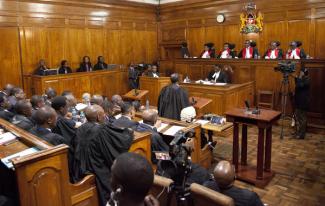Voters
Confusing scenario

The IEBC first set 17 October as an impromptu election date, but later postponed the polls to 26 October. In September, internal IEBC debates on who was to blame escalated into a public dispute. The opposition demanded reforms at the IEBC and threatened to boycott the rerun elections. On the other hand, incumbent President Uhuru Kenyatta’s supporters staged rallies, demanding the resignation of Supreme Court judges.
Rumours and conspiracy theories spread fast. It did not help that the Supreme Court only issued its detailed judgment three weeks after delivering the verdict.
Most Kenyans and the international community interpreted the nullification of the presidential election as a move by the judiciary to show its independence from the other branches of government. It set a precedent for the entire African continent. The scenario is utterly confusing, nonetheless.
Since the verdict was first announced on 1 September, President Uhuru Kenyatta and his Jubilee party have been relying on a narrative of victimisation. They say that Kenyatta’s presidency was stolen by the court. There have been various rallies. In several cities, pro-Kenyatta demonstrators demanded the resignation of two judges: Philomela Mwilu, the deputy chief justice, and Isaac Lenaola. They argued that the two justices were compromised by their support of the opposition.
The Supreme Court rejected such accusations and insisted it would not cave in to illegal intimidation. It appealed to the people to put information into context after photographs showing judges with Raila Odinga, the opposition’s presidential candidate, were used on social media to discredit the judiciary. The photos were old and entirely unrelated to the recent election. It is common knowledge that the Kenyatta camp discredited the International Criminial Court because of a case relating to murderous post-election violence. Ultimealtey, the case was dropped because Kenyan witnesses no longer dared to testify against the president.
While the Kenyatta camp is casting doubt on the integrity of the Supreme Court, Odinga supporters are focusing their criticism on the IEBC. Odinga himself threatened he would not run again unless the entire Commission were newly appointed. He later backtracked and called for individual resignations. The opposition also insists that the IEBC must use transparent and verifiable technology. One of its popular slogans is: “No reforms, no election.” A boycott would obviously undermine the legitimacy of the rerun election.
The Court’s detailed judgment is quite technical and detailed. It does not accuse IEBC leaders of willful manipulation, and this will have come as some relief to Kenyatta and his camp. The points the judgment raises are relevant, nonetheless. The judges found it unacceptable that about a quarter of the paper forms used for result tallying were formally incorrect and that the Court did not get access to the computerised system the IEBC relied on. In essence, the judgment reflects the opposition’s demand for transparent and verifiable technology.
In view of the flaws, it is an open question whether the results were manipulated or not. This issue will probably never be resolved. Doing so would require a thorough assessment of the IT system – which is precisely what the Supreme Court found itself unable to do.
Voters must thus now chose their next president without knowing whether somebody tried to cheat them the last time. In this setting, rumours and conspiracy theories are very hard to prove wrong, so they are likely to have an impact on many voters.
Two other open questions are whether the IEBC will be up to the task of running a flawless election and whether it can convince the opposition of its ability to do so. The media have reported that OT-Morpho, the French company that provides some of the digital equipment, has stated it cannot reconfigure its kits in time for use in another election in October. The IEBC is yet to share with the public how it will ensure transparency in the technology used in transmission of electoral results, and how it will ensure that the transmitted results are verifiable. By postponing the election to 26 October, the IEBC has implicitly admitted that it is running out of time. Kenyan’s long-term trust in democracy, of course, will depend on the rerun elections being clean and fair.
Grace Atuhaire is a free-lance journalist.
graceseb@gmail.com









